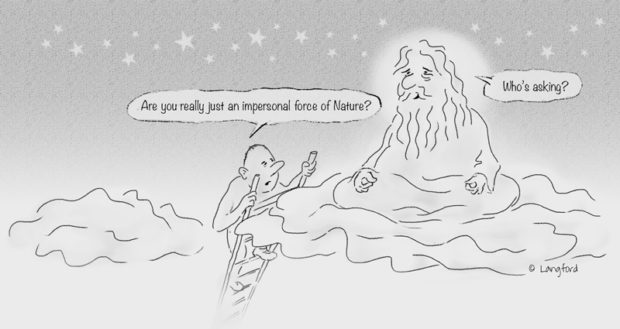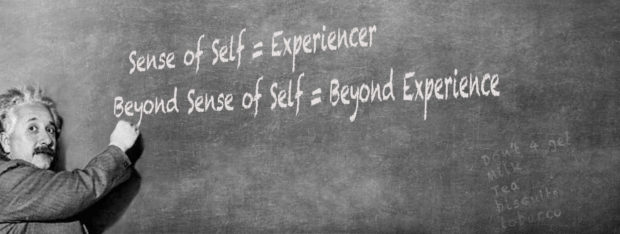
The short answer: "Whatever we think it is, want it to be, or believe it to be".
I Googled "inner peace and happiness" and found 75,000 results - so obviously it depends on who you ask: Bishops, Buddhists, Scientologists, Rabbis, Swamis, Imams, Therapists, Philosophers, Psychiatrists, Uncle Tom or Auntie Mabel, each may have very different views.
In this brief guide I share how I found, or rather developed, inner peace and happiness by regularly pausing the Self of Self and enjoying the state of pure consciousness. I've called this process "spiritual enquiry".
Was it whatever I thought it was? Wanted it to be? Or believed it to be? Absolutely not! It's beyond anything I could have imagined or made up! I had no idea that spiritual enquiry would lead to inner peace and happiness - I wasn't even looking for it and I was surprised when I found that I had it!
Inner peace and happiness is developed during periods of pure consciousness. This experience is beyond words, concepts, beliefs and intuitions. Organic inner peace and happiness is therefore totally independent of whatever I could have imagined, wanted or believed it to be.
An infant is born without a Sense of Self and for the first few months of life exists in the state of pure consciousness, thought-free awareness. For the infant there is inner or outer world, no me and no you. This state of oneness could be considered to be a significant spiritual experience in an adult.
Practicing spiritual enquiry by regularly pausing the Sense of Self allows the mature human organism to reconnect to its original state of wholeness and oneness.
This is felt as a deep spiritual connection, an organic of unity and completeness that I call as inner peace and happiness.
Most people sense that something bigger and greater than themselves exists in the universe. But it's human nature to decorate our instincts and make stuff up. History is littered with man-made spiritual and religious beliefs.
Spiritual enquiry, the art of regularly experience pure consciousness, takes us beyond our ideas, concepts, instincts and beliefs. Beyond the personal is the impersonal. Beyond the Sense of Self is pure consciousness.
The practice of spiritual enquiry makes it clear that pure consciousness is the fundamental source of who and what we are. Calling it an impersonal force of Nature recognises the source is a truly miraculous phenomena.
Don't believe me - practice the spiritual enquiry exercise to confirm or refute this for yourself.
Practicing the spiritual enquiry exercise causes the Sense of Self to pause and the experience of time to stop. This is the state of pure consciousness, which is timeless. It's what's meant by living in "the present moment".
U.G. pointed out that the Sense of Self is a mental function that in our normal daily lives connects each moment together to create the experience of having a continuous independent identity. It’s like a film projector playing a sequence of separate images that appear to be a continuous story.
Classifying who and what we are as just a mental function needn't be a shock to our ego - the human brain is considered to be one of the most complex structures in the known universe, and consciousness one of the most baffling phenomenon to understand. So we are still a miracle to behold!
The only other form of spirituality I've heard of that teaches pausing the Sense of Self is Japanese Zazen. They call this state "no-mind" and consider it to be a higher state of consciousness.
Zazen involves deep meditation, combined with a koan, a type of mantra. It seems to be more suited to a monastic life style and involves lots of discipline, ritual ceremony, and uniformity.
I guess this is a bit too heavy for most people and it hasn't caught on in the West.
The form spiritual enquiry in this brief guide uses a simple visualisation exercise that makes this esoteric art into an effortless everyday pleasure. It doesn't involve meditation, mantras or rituals and it can be effortlessly practiced during a modern busy lifestyle (but see disclaimer).
Please let me know if you hear of other places that teach the experience of pure consciousness.
Enlightened people have described how their Sense of Self became lost or simply uninstalled. The enlightened human organism is conscious, aware and experiences, but without an "I' there is no individual entity present, no experiencer. Outwardly they don't appear any different to you or me.

They see the physical world just as we see it, and are quite capable of doing all the normal sorts of things that life requires. They don't, however, experience the world as we do. Without the "I", the experiencer, there is no them, no us, no inner world, no outer world.
The spiritual enquiry exercise described in this brief guide will enable you to master the art of briefly pausing the Sense of Self. It can't make you enlightened but can lead directly to developing inner peace and happiness. This will change the way you experience yourself and relate to the world, and can add a greater depth and meaning to everyday experiences.
Spiritual enquiry has a cumulative effect, so insights are likely to deepen over time.
Both spiritual enquiry and Zazen aim to pause the Sense of Self and experience pure consciousness. Otherwise they appear to share little in common.
From what I understand, Zazen requires a master and student relationship, involving deep meditation combined with a koan (mantra). It has lots of ritual, ceremony, and involves an ascetic lifestyle. Zen monks wear orange costumes.
Spiritual enquiry can be self-taught, doesn't use meditation, mantras, rituals, ceremony or special clothing. It's based around a simple visualisation technique and can be practiced during a normal busy lifestyle.
Zazen calls the state of pure consciousness "no mind" and considers it to be a higher level of consciousness. Spiritual enquiry recognises it as the natural state of consciousness an infant is born with.
The goal of spiritual enquiry is to develop inner peace and happiness. In what I've read about Zazen inner peace and happiness hasn't been mentioned, but I might not be right about that.
Whatever method is used, pausing the Sense of Self and the experience of pure consciousness are fundamental to spirituality and provide a fulfilling appreciation of life.
The Sense of Self pauses many times during the day without our noticing and doesn't stop us from behaving normally in the world. (See Pausing the Sense of Self)
So it's not surprising that enlightened people, who have permanently lost the Sense of Self, may outwardly appear to be quite normal. They don't bump into chairs or dribble at the mouth, at least not the ones I've met!
The bad news is that they seem to be less likely to excel at subjects such as mathematics, engineering and science.
The good news is that the lack of a Sense of Self is definitely an asset for anyone planning to become a spiritual teacher.
Pure consciousness is a refreshing experience. It's taking a holiday from the constant mental activity that keeps us from appreciating how timeless and precious the present moment is. It's a natural spiritual high.
I doubt I would feel quite as happy, positive or optimistic if I didn't have an organic sense of inner peace and happiness. I feel whole and complete and at peace within myself. The regular experience of pure consciousness means that I don't have a use for recreational drugs.
I may be biassed but I can't imagine that any amount of success, wealth or worldly happiness could replace the deep sense of inner peace and happiness that I've gained from spiritual enquiry. Indeed some of the most talented, creative, successful and inspiring people have turned out to have deeply troubled inner lives.
I guess a sense of inner peace and happiness will probably have similar mental and physical health benefits to people who meditate regularly. So it may reduce stress, the incidence of some diseases, and increase longevity.
I often become tense over minor matters but briefly pausing the Sense of Self helps me to keep things in perspective.
I rarely become very annoyed or upset, but when I do it's from something that triggers old baggage and deep unresolved feelings. A few minutes of pure consciousness can soften such emotions and clear my mind. I am then more able to respond in a balanced manner rather than to just react.
I still have a self-critical inner voice that loves to find faults, but with inner peace and happiness it now doesn't get in the way. I have a healthy response to mistakes that I am willing to acknowledge and do my best to learn from.
I still use personal growth techniques - the Sense of Self is so strong and persistent that it's sensible to use more than one way to deal with it.
Have you ever had a moment in your life when everything was so wonderful that you thought "things can not get any better"? Pure consciousness is that moment without the need of anything to cause it!
Short answer: no.
Being in the moment has several meanings. As a personal growth technique it can mean being fully present and aware. In meditation it can mean deep thought-free awareness. It might also be used in philosophical approaches to life.
Whichever way we experience being in the moment involves the Sense of Self being active. Pure consciousness, however, requires pausing the Sense of Self .
Neither you or I can experience pure consciousness. In our absence, when the Sense of Self is paused, the human organism is still conscious and aware. It's the human organism that experiences pure consciousness.
We are aware of moments ticking away, but pure consciousness is timeless. It's beyond the "you", beyond the "I", and beyond any concepts we can have about it.
By practicing the spiritual enquiry exercise pure consciousness can be experienced. It takes only 30 seconds and is time well spent!
Spiritual enquiry
Stumbling into it
Some extras
Disclaimer
